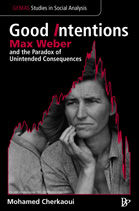 |

Sample Chapter (pdf) Gemass website |
Good Intentions: Gemas Studies in Social Analysis NO LONGER AVAILABLE All of human life is affected by the awkward fact that, as Robert Burns said: “the best laid plans of mice and men often go awry”. Taking his cue from Max Weber’s seminal insights into this phenomenon, Mohamed Cherkaoui explores this paradoxical world where good intentions so often produce unintended consequences. A famous example is the role of Protestantism in the rise of modern capitalism. The book offers a profound analysis of Weber’s classic essay on this topic, and his theories about the sociology of religion and of rationalisation that lie at its heart. As Professor Cherkaoui demonstrates, this approach remains of great relevance to an understanding of contemporary problems such as Islamic fundamentalism. Professor Mohamed Cherkaoui has undertaken a remarkably original exercise in teasing out the various assumptions in the development of social theory that have been important in expressing the idea of unintended consequences. More importantly he has developed an excellent typology that attempts to transform these assumptions into a coherent theory of action and unintended outcomes. Contents: |
Email: info@bardwell-press.co.uk Tel.: 01865 865 865 Fax: 01865 595 598